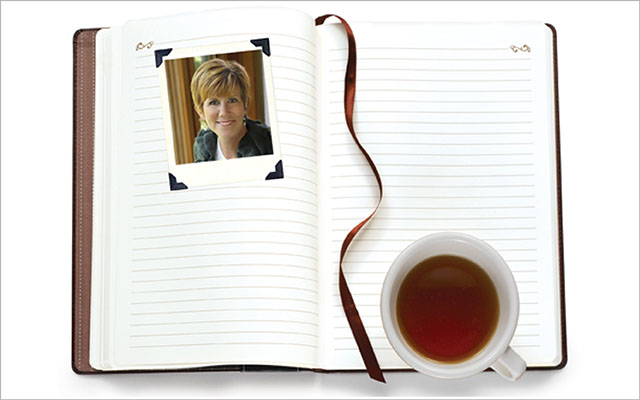Every year, Deborah Besch escapes the pressures of work and family to spend a weekend with her best girlfriends. They prepare meals together, quaff wine and lose themselves in late-night conversation. “They’re my dearest friends,” Besch says. “We’ve been doing it for years.”
But this year, instead of happily anticipating the festivities, Besch was filled with dread. She had recently celebrated her 49th birthday and was determined to achieve a healthy diet and exercise routine before she reached 50. How would she stick to her regimen during such a celebratory occasion?
“You get caught up in the fun, and everyone is enjoying themselves so much,” she says. Inevitably, in spite of all her good intentions, she thought, the weekend would derail her diet or her exercise program. “It’s incredibly frustrating to know what you need to do and not know how to do it.”
This time was different. Besch is enrolled in the Women’s Wellness Journey, a health-coaching program offered through St. John’s Hospital in Maplewood, Minn. She meets weekly with Selina Blatz, a certified nurse practitioner and wellness coach, to discuss her exercise and weight-loss goals. Together, they prepared for the weekend getaway, coming up with practical strategies for maintaining her personal commitments while still enjoying the time with her friends.
Their strategy was simple enough. Besch prepared some food that fit with her new healthy lifestyle, paced her alcohol consumption, and when she faced a fat-filled temptation she couldn’t resist, she went ahead and enjoyed it in moderation. Instead of turning into a session of guilty bingeing, the weekend festivities left her feeling in control and on course.
Besch’s struggles might sound familiar to anyone who has faced the challenge of adopting a healthy lifestyle, but the methods leading her to success may not. Health coaches — specially trained healthcare professionals who develop an ongoing, one-on-one relationship with their clients — have been around for a couple of decades, but the concept is just starting to catch on.
A growing number of employers, healthcare institutions and consumers are discovering that coaches can make a difference in ways traditional practitioners can’t, especially in the areas of prevention and education.
Organizations are experimenting with various programs, and coaches are trying out new techniques and applying old ones to new health-related areas. And while there are a variety of coaching approaches out there, some common principles are emerging.
Chief among them, says Blatz, is that coaching addresses what she calls the “thinking and feeling” component of wellness.
“The way I learned under the medical model is that you educate your patients on how to make a change — for example, to quit smoking or start exercising,” she explains. “In coaching, we ask them where they want to make a change, why they want to make it and what gets in the way. The core of wellness coaching is that the client comes up with the answers. They feel empowered.”
Combating Noncompliance
Most of us know we should exercise and eat more vegetables, but often we feel too busy, too tired or too tempted to bother. In the world of healthcare, this notion is known as “noncompliance,” and it’s a big problem.
Between 30 and 50 percent of patients routinely ignore medical advice, whether it’s a simple prescription for medicine or more-challenging lifestyle changes. When you tally up the hospitalizations, complications, diseases, disabilities and deaths attributable to noncompliance, it ends up taking a $100 billion bite out of the U.S. economy every year. In an era of skyrocketing healthcare costs, a number like that gets attention.
The first health coaches were trained to combat noncompliance: They helped patients with chronic conditions like heart disease and diabetes remember to take their medications and manage their medical conditions. But while this “disease management” approach made a big difference in the lives of people with chronic conditions, it didn’t do much to reduce healthcare costs, especially when it came to long-term behavior change, explains Sean Slovenski, president and CEO of Hummingbird Coaching Services, a Web- and phone-based coaching service for employers as well as individual consumers.
“These are the proverbial 20 percent of the people who are incurring 80 percent of healthcare costs,” Slovenski says. “But right behind them are another 40 percent or more who, once they age, are going to develop those chronic conditions. If you focus on that group, you can stop them from getting sick.”
“These are the proverbial 20 percent of the people who are incurring 80 percent of healthcare costs,” Slovenski says. “But right behind them are another 40 percent or more who, once they age, are going to develop those chronic conditions. If you focus on that group, you can stop them from getting sick.”
Intervening at an early stage requires a different approach than disease management. Someone who already has diabetes needs help making drastic changes in diet and assistance with managing prescription drugs. Someone who is relatively healthy, but carries a risk for diabetes, needs more fundamental support. “The vast majority of illness is rooted in lifestyle,” he explains. “Obesity, smoking, lack of exercise, poor nutrition. It’s the other side of the healthcare equation. It’s where the rubber is hitting the road.”
To help clients make sustainable lifestyle changes, many coaches rely on the tenets of positive psychology. “Research shows that if you can structure your goals so that they’re specific and time-bound, and you include a reward and a support mechanism, you have a much greater chance of success,” notes Slovenski.
It’s also important to tie a client’s goals to her “character strengths” — the personal preferences that make each of us unique. Character strengths are another core concept in positive psychology. “If one of your core strengths is appreciation of beauty, I wouldn’t structure a walking program on a treadmill staring at a brick wall,” Slovenski explains. Instead, “maybe this person could tour a museum as part of a walking program. The point is to structure the program so that the things they do make them feel good.”
Taking the time to understand these subtleties of character — finding out what will make life more satisfying — is one of the cornerstones of coaching. “Most people know what to do and want to do it, but they don’t believe they can. With a good coach, the client leaves the session saying, ‘I’m good. I can do this,’” says Margaret Moore, founder and CEO of Wellcoaches, a company that trains healthcare professionals in coaching and is endorsed by the American College of Sports Medicine.
“A good coach,” she says, “is constantly challenging and probing to help the client think through things in a more intense and comprehensive way than they’ve done before.”
According to Moore, who also blogs about coaching at www.coachmegblog.com, the main division in the field of coaching today is between “consumer-driven” coaching and coaching provided by an employer or healthcare provider.
“Consumer-driven is more like a personal trainer or life coach,” she explains. “The consumer chooses the coach and decides what to work on, whereas in healthcare, the employer pays, and the coaching might be focused on a topic, like smoking cessation. In this setting, the client doesn’t choose the coach, but the coaching is free [to them].”
Beyond these broad categories, she adds, coaches may have specialties, depending on their background. Most are trained as nurses, psychologists, doctors, nutritionists or some other medical professional, and they often bring the expertise and emphasis of their training to their lives as coaches. “If you work with a nurse, you will be able to talk more about blood pressure; if you work with a dietitian, you may spend more time on nutrition,” Moore says.
“A good coach,” she says, “is constantly challenging and probing to help the client think through things in a more intense and comprehensive way than they’ve done before.”
Most coaches begin an engagement with a workup of tests to determine a baseline for overall health — cholesterol and blood screenings, body-composition analysis, physical- fitness assessments, and a family health history, for example. But the bulk of the ongoing work is customized to the client’s needs and consists of listening and support more than the dispensing of medical advice.
When Deborah Besch first met with Selina Blatz at St. John’s Hospital, for instance, her primary concern was her weight, which she’d struggled with since her mid-30s. She had watched both her parents grapple with a family history of colon cancer, diabetes and heart disease — her father had lost his mobility and independence — and she wanted to make serious changes.
Working with Blatz, she established short- and long-term goals and identified methods to achieve them. For example, Besch ate a lot of processed foods, so she joined a weight-loss program that included cooking classes. Today she prepares most of her meals from scratch.
To make these kinds of fundamental lifestyle changes — which involved uncovering deeper issues that shook her confidence, like relationship stress — Besch needed to have regular contact with her coach. Their weekly phone conversation proved to be just the thing. “It was a huge part of the success,” Besch says. “I could easily have dropped the weight-loss program, except I knew that I’d be getting a call on this day, and there’s no way around that.”
The ongoing relationship between coach and client — and the trust and accountability it inspires — defines the fundamental difference between coaches and other healthcare professionals. “I tried working with a behavioral psychologist, and it wasn’t the same,” says Besch. “There was a lot of digging into my past, but I didn’t have someone my age dealing with the same issues, who had the background and tools to help me address specific situations. With my coach, it’s a mentorship. I’m not just another client or patient, and she’s seen a thousand of them. It’s a friendship-based relationship.”
Industry Interest
The success of coaching programs like these has the healthcare industry taking note. A growing number of hospitals, insurance companies and employers are experimenting with various coaching models, hoping to apply the techniques and potential cost benefits. As a result, there are now a wide variety of coaching programs.
Kaiser Permanente’s San Francisco Medical Center, for instance, offers a flexible personal-health-coaching program through its health-education department. Structured as an à la carte menu of services, the program can range from a one-time consultation to a package that includes a full battery of health tests and up to eight sessions with a coach.
As employers bear an increasing share of the rising costs of healthcare, however, they’re looking to coaching’s early prevention benefits and hoping to reap savings.
The investment is generally considered a worthwhile one: Various studies have estimated that every dollar spent promoting healthy lifestyles saves three dollars in employee healthcare costs. If it proves effective in a medical-benefits model, coaching could potentially improve those numbers.
Various studies have estimated that every dollar spent promoting healthy lifestyles saves three dollars in employee healthcare costs. If it proves effective in a medical-benefits model, coaching could potentially improve those numbers.
That’s what Blue Cross Blue Shield of Michigan (BCBSM) was hoping when it unveiled a plan to offer health coaching for its enrolled companies.
Products and programs that use health coaching are built specifically to generate savings for employers who cover their employees’ health benefits, explains Cindy Bjorkquist, director of wellness and care-management consulting at BCBSM. “The model follows the theory that ‘cost follows risk,’” Bjorkquist explains. “If you can reduce the risk, you can reduce the costs.”
Coaching alone might not reverse the trend of rising healthcare costs, she admits, but the insurance company is banking on the fact that it will slow the rate of growth in premium costs.
Under the plan, members who work with a coach and remain compliant save money on their copayments. “Research shows that without an incentive, you may get 10 or 20 percent enrolled,” Bjorkquist says. “But employers are starting to say that if you don’t become accountable for your health, then we will use incentive structures like higher copays and premium surcharges if you don’t participate.”
Currently, she says, some companies go a step further and tie incentives to health outcomes for people who actually achieve their wellness goals. Indeed, Bjorkquist imagines a day when health insurance is tied to healthy behavior.
It remains to be seen whether the motivation and trust that form the foundation of health coaching can translate to the world of insurance premiums and institutional accountability. But success stories like Deborah Besch’s offer a heartening glimpse of what healthcare could look like if it found a way to incorporate personal relationships and support along with medical information and treatments.
Besch recalls a moment early in her work with Blatz after she had managed to shed 15 pounds. “I was feeling very good, until one day when I was around a friend who was very slim and looked great,” she recalls. “I was in my old baggy clothes, and I felt like a failure. I felt like I had accomplished nothing. That would have been the point at which I would normally have said, ‘Forget it. This is a waste of time.’”
Instead, she reached for the phone. When Besch connected with her health coach, she didn’t get an earful about body-fat percentage or diet medications. Her coach’s advice was simpler. “Selina told me, ‘Go try on some new clothes and buy a couple outfits in your new size.’”
That advice kept Besch on the path toward her goals. “I was still overweight, there’s no doubt about it,” she recalls. “But I had dropped a dress size, and I just hadn’t realized that success.”
Find a Healthy, Helping Hand
One good way to start your search for a health coach is with your employer or local hospital. Many healthcare facilities are experimenting with wellness initiatives, and some of them are subsidizing the costs of the program. Other resources for finding a coach are listed below.
Wellcoaches A health-coach training organization that provides an online search function for locating a wide variety of Wellcoach-certified coaches nationwide. www.wellcoaches.com
International Coach Federation An organization that credentials coaches, with an emphasis on business and personal coaches. The organization’s Web site provides an outline of their credentialing process, as well as its ethical guidelines. www.coachfederation.org
The Right Fit
Consider the following criteria when deciding if a coach is right for you:
Certification. At the moment, there is no one credentialing process for coaches — health-oriented or otherwise. Several organizations provide training and certificates. Wellcoaches (www.wellcoaches.com) offers certifications specifically for health, fitness and wellness coaches who already hold other professional credentials. Many hospitals and healthcare programs train and certify their own medical personnel. Ask a coach about his or her training (or do online research) before becoming a client.
Specialty. Most certified coaches are trained in the fundamentals of coaching — how to connect with you and effectively help you achieve your goals. If you have particular health issues, however, you may want to seek out a coach with expertise in those areas. If you are at high risk for chronic health conditions, consider a coach with a medical background. If you’re primarily concerned about your weight, look for a coach with a suitable nutrition, fitness or behavior-modification background. Make sure you get a preliminary health workup or fitness assessment that will help you set and achieve your goals.
Personality. Your health coach is part mentor, part healthcare consultant, part confidant — so personality fit is probably the most important factor. Most people tend to seek coaches who come from life circumstances similar to their own.
This article has been updated. It originally appeared in the November 2007 issues of Experience Life.




This Post Has 0 Comments